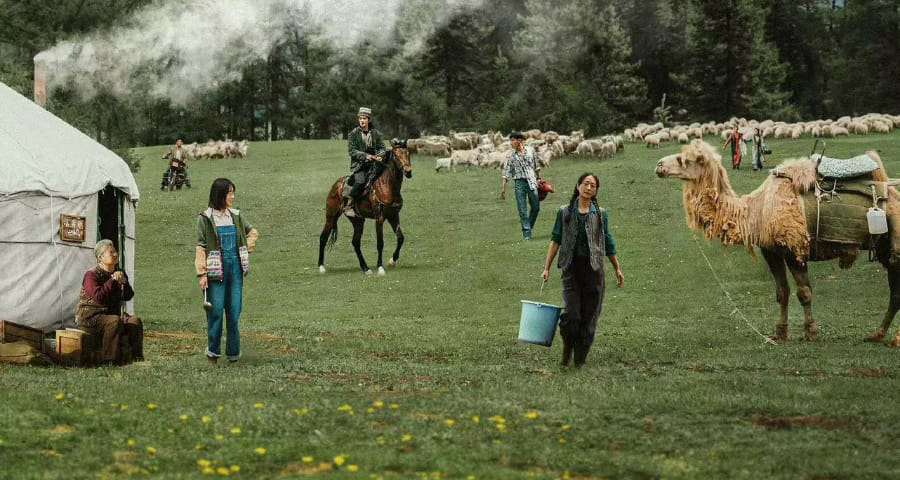To the wonder premiered globally at the Cannes TV Festival on April 7th, local time in France. As the first Chinese-language drama to be nominated for the main competition unit of the Cannes TV Festival, To the wonder is adapted from Li Juan’s eponymous essay collection. It tells the story of Han Chinese girl Li Wenxiu, who dreams of pursuing literature in big cities but repeatedly encounters obstacles and is forced to return to her hometown, a small town in Xinjiang, to live with her mother who runs a small store. After meeting Kazakh teenager Batai, Wenxiu gradually discovers the beauty of the local area. The drama, while preserving the literary style of the original work, incorporates a light comedy expression to bring a novel narrative and audiovisual experience to the audience.

Focusing on the Customs and Practices of Altay, Xinjiang, China, It Tells the Story of the Prairie from a Delicate Perspective
To the wonder unfolds from the perspective of Li Wenxiu, a Han Chinese girl living in Altay, Xinjiang, China, recreating the prairie scenery and lifestyle of Altay, as well as the cultural and folk customs of Xinjiang and the simple and resilient spirit of the local herdsmen. It expresses the thematic connotation of respecting nature and seeking true self.
The two episodes screened at the Cannes TV Festival showcase the local customs and scenery of Altay, reproducing the prairie life from a delicate perspective. The characters introduced in the first two episodes, such as Li Wenxiu, Batai, Zhang Fengxia, Sulitan, and Daken, all have their own vivid and bright characteristics. The persistent pursuit of dreams by Li Wenxiu and Batai, and how they seek solutions to conflicts with their parents’ beliefs, are eagerly awaited. In addition, Zhang Fengxia’s transparency, Sulitan’s adherence to nomadic life, and his respect for nature are all moving. The sincerity of the lead actors immersed in their roles and stories resonates with the audience. The plot of the friendly coexistence between the Han Chinese girl Li Wenxiu, her mother Zhang Fengxia, and the Kazakh people in the first two episodes reflects the friendly and kind nature of the local people. The unique customs and traditions of Altay and the traditional Chinese concept of «family» presented in the film are very touching.
Quality Production Explores Prose-like Creation, Cinematographic Lens Showcases the Magnificent Scenery of Altay
The exploration of prose-like expression, cinematographic lens, and exquisite music showcases the magnificent scenery of Altay. The cinematographic lens reproduces the beautiful scenery of herds of cattle and sheep, blue sky, and green grass. The overall music in the drama is mainly based on the melodious and atmospheric folk songs of the Kazakh ethnic group, which, combined with the prairie scenery, brings a unique audiovisual experience to the audience.
It is worth mentioning that the cast of To the wonder is very high-quality. Ma Yili, who plays Zhang Fengxia, is a well-known Chinese actress who has starred in many quality dramas. She plays Zhang Fengxia, a mother who is very perceptive in dealing with people and things. Facing the difficulties encountered by her daughter Li Wenxiu, she carefully analyzes and guides her, with every words pointing out the direction and comforting her daughter. This time, Ma Yili’s delicate and sincere portrayal of a Han Chinese woman living in the Altay region, bursting with free and vibrant vitality on the vast prairie, forms a sharp contrast with her previous roles. Zhou Yiran partners with Ma Yili to play mother and daughter, and the unique chemistry between them in To the wonder has aroused much empathy among the audience. Yu Shi’s portrayal of Batai’s sincere and passionate emotions when facing his beloved horse TaXue is touching. The audience said: He brought the free and sincere prairie teenager on horseback to life.
After the screening, the audience and the media gave high praise to the drama, believing that the creators’ ambition and difficulty in adapting this essay into a TV drama are admirable. Through this drama, they felt the vastness of Chinese land, gained a deep understanding of the lives of traditional herdsmen, and saw the magnificent snow-capped mountains and clear lakes of Altay. It subverts the narrative style and expression of traditional TV dramas and will bring more inspiration to the innovation of TV drama expression.

